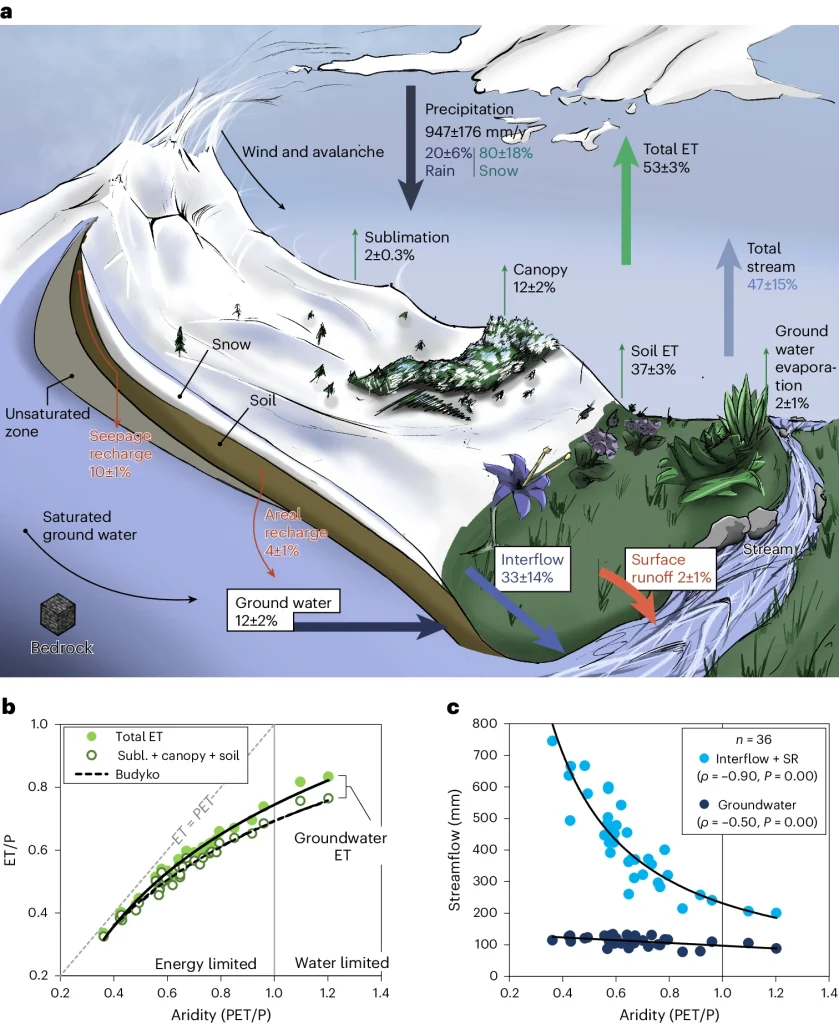- Drought & Demand: Climate change is straining prior appropriation doctrine, the foundation of water law in the western U.S.
- Priority System Challenged: The “first in time, first in right” principle may not be adaptable enough for escalating scarcity.
- Over-Allocated Resources: Many western rivers, including the Colorado, are already over-allocated, making equitable distribution difficult.
- Groundwater Concerns: The study highlights the interconnectedness of surface water and groundwater, particularly in the Colorado River Basin.
- Legislative & Policy Changes Needed: The study urges legal reform to ensure more flexible and resilient water management, including integrated surface and groundwater governance.
May 29, 2024 — A newly published study titled Declining groundwater storage expected to amplify mountain streamflow reductions in a warmer world highlights the escalating challenges facing western water law due to climate change, emphasizing the growing concerns surrounding groundwater’s role in the stressed Colorado River system. The research focuses on the prior appropriation doctrine, the cornerstone of water allocation in the western United States. This legal framework prioritizes water rights based on the principle of “first in time, first in right,” meaning those who first claimed and used water have superior rights over later users.
highlights the escalating challenges facing western water law due to climate change, emphasizing the growing concerns surrounding groundwater’s role in the stressed Colorado River system. The research focuses on the prior appropriation doctrine, the cornerstone of water allocation in the western United States. This legal framework prioritizes water rights based on the principle of “first in time, first in right,” meaning those who first claimed and used water have superior rights over later users.
The study argues that this system, while effective for a time, is increasingly ill-suited to address the growing water scarcity exacerbated by climate change. As droughts intensify and the demand for water rises, the inflexibility of the prior appropriation doctrine is becoming a major obstacle to equitable and sustainable water management. The interconnectedness of surface water and groundwater further complicates the situation, particularly in the over-allocated Colorado River Basin.
Groundwater and the Colorado River.
The study emphasizes that groundwater is crucial in sustaining the Colorado River, contributing a significant portion of its flow. However, the historical separation of surface and groundwater law in many western states has led to fragmented management approaches. This fragmentation, combined with increased groundwater pumping to compensate for dwindling surface water supplies, has raised alarms about the long-term sustainability of the Colorado River system.

 .
.Over-Allocation and Inequity.
One of the most pressing issues is the widespread over-allocation of water resources. In the Colorado River Basin, the amount of water promised to rights holders far exceeds the available supply. This situation, coupled with the rigidity of the prior appropriation system and growing groundwater concerns, can lead to significant inequities. Junior water rights holders, often including agricultural operations, municipalities, and environmental flows, are particularly vulnerable during scarcity.
The study’s authors warn that without significant legal and policy reforms, these inequities will likely worsen as climate change intensifies. They argue that the prior appropriation doctrine, with its emphasis on historical use and limited mechanisms for reallocating water, is not agile enough to respond to the rapidly changing conditions and the complex relationship between surface and groundwater.
A Call for Reform.
The study calls for fundamentally rethinking western water law to create a more adaptive and resilient system. It suggests exploring alternative allocation frameworks that prioritize flexibility, collaboration, and the protection of environmental flows. The authors also emphasize the need for increased investment in water conservation and efficiency measures to reduce overall demand. Critically, they stress the importance of integrated surface and groundwater management to address the interconnected nature of these resources.
The Way Forward.
While the challenges are significant, the study offers a hopeful note. It highlights several successful examples of collaborative water management initiatives in the western U.S. that have moved beyond the limitations of the prior appropriation doctrine and embraced integrated water management approaches. These examples demonstrate that it is possible to develop innovative solutions that balance the needs of different water users while ensuring the long-term sustainability of both surface and groundwater resources.
The study concludes with a call for urgent action to reform western water law and create a more equitable and climate-resilient water management system. The authors argue that this is essential to protect both human communities and the environment in the face of an increasingly uncertain future, where the interconnectedness of surface and groundwater resources will only become more critical.
Citation; More Information.
Carroll, R.W.H., Niswonger, R.G., Ulrich, C. et al. Declining groundwater storage expected to amplify mountain streamflow reductions in a warmer world. Nat Water 2, 419–433 (2024). https://doi.org/10.1038/s44221-024-00239-0

